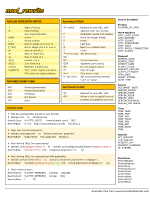RegEx and the Mod_rewrite reference sheet
 Dave Child, a Brighton UK based Web developer offers a series of free Reference/Cheat sheets that I think most web developers will find of value. He obviously invested a lot of time and effort into them and it shows. He's created free cheat sheets for MySQL, Javascript, PHP, RGB colors and the subject of today's Gizmola.com entry, Apache mod_rewrite. If you've used Apache there's a good chance you've heard of mod_rewrite, although you might not understand what it can do for you. Lately, a lot of PHP scripts are including functionality that will create mod_rewrite rules and add them to a .htaccess file to support "SEO friendly" url's. Serendipity, which runs my blog, and the popular PHP Content Management System Mambo/Joomla are just two examples of packages that can do this for you.
Dave Child, a Brighton UK based Web developer offers a series of free Reference/Cheat sheets that I think most web developers will find of value. He obviously invested a lot of time and effort into them and it shows. He's created free cheat sheets for MySQL, Javascript, PHP, RGB colors and the subject of today's Gizmola.com entry, Apache mod_rewrite. If you've used Apache there's a good chance you've heard of mod_rewrite, although you might not understand what it can do for you. Lately, a lot of PHP scripts are including functionality that will create mod_rewrite rules and add them to a .htaccess file to support "SEO friendly" url's. Serendipity, which runs my blog, and the popular PHP Content Management System Mambo/Joomla are just two examples of packages that can do this for you.
For example, if your script uses a parameter like this: http://www.yoursite.com/home.php?id=5
A mod rewrite rule can allow users to use: http://www.yoursite.com/home/5/
Many search engines seem to penalize sites that use URL parameters, and are more likely to index and value the non-parameter version. Of course, that's not all that mod_rewrite can do. Many people use it for its ability to offer at least a layer of Hotlink protection, or to handle things like forwarding visitors from obsolete pages that might exist in a search engine to the new ones.
Using and understanding the black magic of mod_rewrite requires a basic understanding of Regular Expressions or as they are typically known: RegEx. If you're new to RegEx, think of them as wildcards on steroids. The October Lampsig meeting will present RegEx basics, and if you're in Los Angeles, definately try and attend the presentation, which will be given by Peter Benjamin. Check out Dave Child's succint reference for this powerful module whether or not you plan to attend Pete's presentation.
